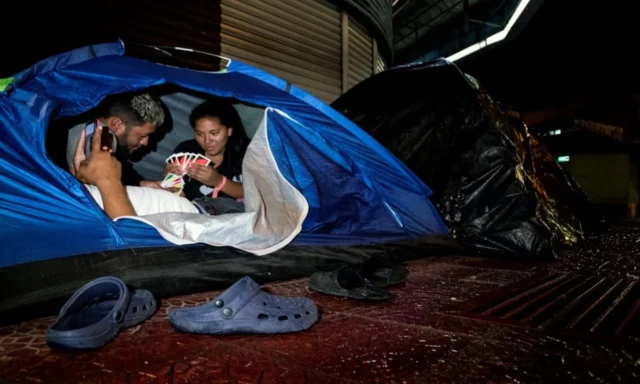While thousands of people cross Central Avenue on foot, or even almost running, on their way to work, the bus stop or the day’s errands, while dozens of others are stationed on the banks, aimlessly.
Until a few weeks ago, several of them left Venezuela determined to reach the United States. To that end they took out savings, sold properties or abandoned the few things they had left in their country.
The path to the “American Dream”, however, was now cut short
A new obstacle was added to the traditional dangers of the route such as the Darien Jungle, the Central American territory or human trafficking networks: in the middle of the month an order from the United States Government came into force, according to which Venezuelans who entered irregularly would be returned to Mexico.
The news, Venezuelans passing through San José say, was to be expected. The problem is that they expected it for later.
While some are waiting for what will happen in the coming weeks, others are beginning to think about what to do to return to their homeland, even though they no longer have a home or even a family waiting for them.
The race was not enough
The political situation in Venezuela had been expelling hundreds of thousands of its citizens for years, but to understand the latest wave, you have to look much further north.
In a few days, the United States will have mid-term legislative elections, where President Joe Biden will risk much of his political capital. The immigration issue, as expected, will be key in the elections and that is when the fears for Venezuelans started.
The possibility that the US border would be closed was real and that was when the exit was accelerated.
Many came directly from their nation but thousands of others had left Venezuela a few years ago and had settled in Colombia, Peru or Chile. Given the complications that they also began to suffer in those places, they bet everything to risk it on a trip to the United States that, at least for now, will not be possible.
That happened, for example, to Junior Castilla, who was based in Colombia and who tried to run to get through before the border closed.
Halfway through, however, he was surprised by the news and now sees himself looking for options in Costa Rica. At the moment he keeps selling embroidery on Central Avenue.
Go back to Venezuela?
Weeks ago, the migrants had a clear slogan: “Returning to Venezuela is not an option.”
Now that the landscape has changed, they have also had to change his travel plan.
Several of those consulted said they will take a few days to see what to do. Some are already processing refugee status -although the appointments were given for March-, others are looking for what to do and some even said that they would look for a job for the Christmas season to see what the new year brings.
For others, however, the “American Dream” reached San José. Now they ask for help or sell sweets to finance a place to sleep and a ticket to return.
That is the experience of Nazareth Salas, who told his story on the condition that his face not come out:
The paper challenge
Junior, Nazareth and other South Americans agree in reiterating their gratitude to Costa Rica. They highlight the hospitality they have received, the food that many people have given them and even the messages of support, which they were not given in other countries.
But on the other hand, the migrant group runs into bureaucracy and the various requirements that each country imposes.
And it is that the obstacles are not only to the north but also to return. Days ago, for example, Panama closed Paso Canoas for Venezuelans without a visa, thus adding a new obstacle.
The visa application for Panama is a not so simple process that can take up to 60 days and requires a payment of $60 that not all people can afford.

Options for Venezuelans
María Faría, Ambassador of Venezuela in Costa Rica, explained how the options are reduced and how they have tried to handle the situation.
On one side are the travelers who came from their country. In those cases, a safe-conduct can be issued so that they return via Panama, with a maximum stopover of 4 hours in the neighboring country.
The other is that they travel to Colombia, which has more options to receive them.
Although there are 4 airlines providing services -Copa to Panama and Colombia, as well as Wingo, Volaris and Avianca to Bogotá- the economic issue also comes into play.
“Given the high cost it has taken a long time to get affordable prices for them to be able to return,” said the diplomat.
Faría estimates that some 400 safe-conducts have been issued.
In contrast, guidance is also given for Venezuelans who came from other countries and who cannot return to their homeland.
“Our job was to inform them of the requirements they needed to return to the country where they lived or guarantee their safety because many of them were deserters or were persecuted and the only way was to return to those countries where they already lived,” he said.
She added that the community of Venezuelans activated their collaboration network for their compatriots from the beginning. Food, medicine and other assistance mechanisms have been provided.
The Embassy of Venezuela had to improvise offices in places of assistance such as the Salvation Army or the Works of the Holy Spirit to issue documents to its nationals.
Heading south
Although the exact number is not specified, at the beginning of the week the General Directorate of Migration had indicated to this medium that the flow of Venezuelans to the north had decreased.
“We allow ourselves to communicate that the migratory flow of Venezuelans to the north has decreased, now the migratory flow is happening in reverse,” they stated.
At one point the government expected to receive up to 3,700 migrants per day. For this, a mobilization protocol was planned in case it was necessary.
Now, the demand for transportation is going south and even the Tracopa bus company announced that it would donate the trip for those who went back. That operation began on Thursday and that day alone they transferred 110 people according to Miguel Zamora, spokesman for the company.
Returning to Venezuela, although it was not a plan, is becoming an option for those who wanted to flee from it.

